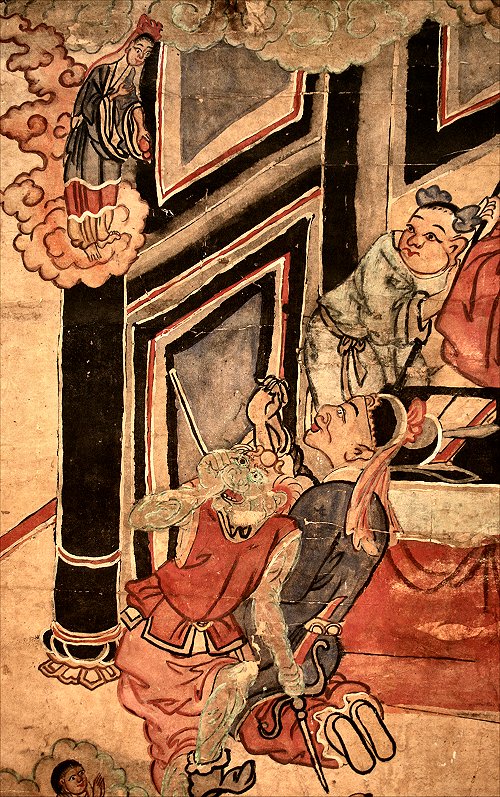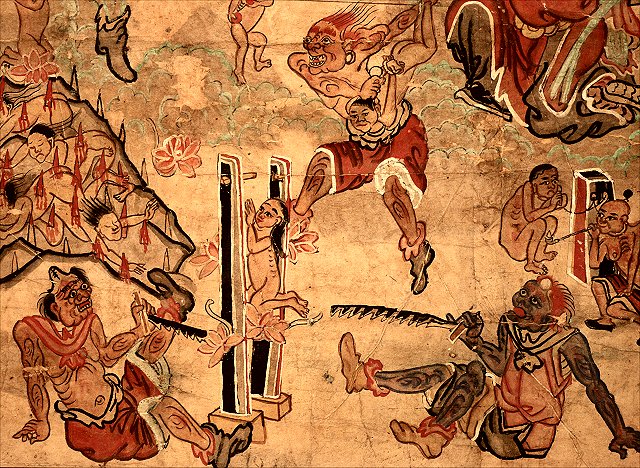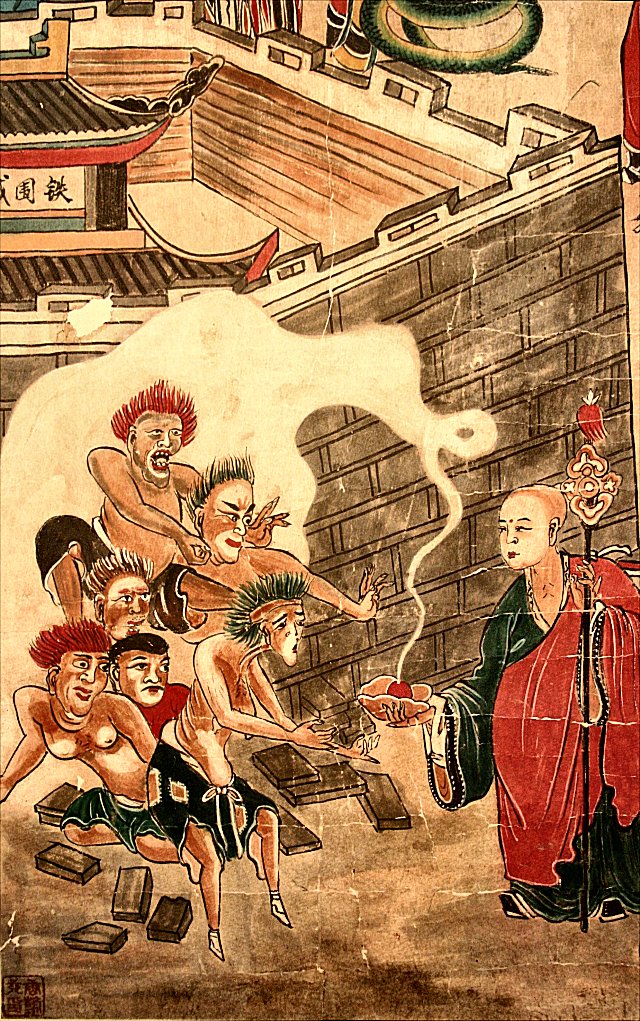
Jailbreak....
The walls of "Iron enclosure hell" come down as Dizang (Ksitigharba) shows mercy to the damned in scroll L08.
Only indirectly addressed in the A series, the notion of grace may be at odds with a mechanical system of karmic retribution, but other hell scroll sets often depict moments of mercy. Such moments may serve two functions: 1.) they justify the ghost festival on the 15th day of the 7th month when part of hell's population is permitted to return to the earth, and 2.) they may in fact rhetorically magnify the torturous horror through contrast, the imagination not becoming numbed by unabated carnage. (The latter is merely my own speculation.) These moments of mercy are mainly credited to three bodhisattvas who separately intercede in hell, namely Guanyin, Dizang and Mulian.
Glen Dudbridge well summarizes the merciful role of Guanyin in his Legend of Miao-shan as follows:
Kuan-yin is one of a large mythological company, spread through many cultures, who perform the exploit of going to Hell to save the damned. In Chinese Buddhist tradition it is a role shared also by Ti-tsang (Ksitigarbha), the bodhisattva for whom the underworld is a permanent abode. He presents a challenge to the absolute and undeniable justice of the King of Hell: In a quarter where the laws of retribution exact their due, this saviour is yet able to confound them through his powerful compassion. Kuan-yin came to China already possessing the same property. The Lotus sutra offered the faithful an assurance that to think upon the power of Kuan-yin would bring deliverance from 'all the evil states of existence, hells, ghosts and animals.' The Karandavyuhasutra gave a more explicit account of how Kuan-yin entered and moved gloriously through the Avici hell, transforming it into a paradise, then turned to the Citadal of the Hungry Ghosts, quenched its fires, gave the inmates food and drink, and led them to rebirth in the paradise Sukhavati.
These teachings have profoundly influenced Chinese religious practice. Kuan-yin, like Ti-tsang, has for centuries been ritually enlisted when the souls of the newly dead have to be helped in their passage through the other world, particularly at the series of critical arraignments in the courts of Hell which culminate, on the forty-ninth day after death, with the moment of rebirth in a new existence. The filial duty of mournerrs through this period, and later on recurrent 'memorial' occasions, is to add to their deceased relatives' store of merit by various ritual means. The Feeding of Hungry Ghosts is designed to serve this end.
Dudbridge here likens Guanyin's role to that of Dizang, and it is thus not surprising that the two were often associated with one another. As Zhiru in The making of a savior bodhisattva: Dizang in medieval China amply demonstrates, "Indeed visual, inscriptional, and narrative materials suggest that Dizang and Guanyin were frequently venerated together in medieval China." Visually they even became a pair of bodhisattvas flanking the Buddha Amitabha, creator of the Pure Land paradise that is regularly referenced in the first scrolls of each set.
Jan Chozen Bays describes Dizang's introduction of mercy into the karmic machine as follows:
Ti-tsang was portrayed as a powerful overlord who could intercede with the Ten Kings, argue for leniency and soften their judgments. He was also a compassionate priest. If he knocked on the doors of hell with his ring staff, they had to open. As he descended into hell, the cintamani jewel brought light into realms of utter darkness and despair. If he could discern even one good deed in a person's life he could plead for leniency. If he were able to find more virtuous actions, he might win acquittal. He could relieve prisoners from their shackles and, in some illustrations of [the Ten kings sutra], it is he who gives those who have undergone torment in hell the broth of oblivion to drink.
Finally, Guanyin and Dizang share a salvific role with Mulian who does indeed appear in the A series at A10 (see the excerpt of Mair's translation of the Mulian sutra there) and who achieves this ability to extend mercy through his extraordinary filial piety. Ellen R. Judd who has studied the Mulian opera describes how he comes to bring mercy into hell as follows:
After [Luobo's] transformation into Mulian, he is able to move the highest celestial authority to initiate the yulanpen festival for hungry ghosts. All these acts of imitation or transformation are linked to exceptional efficacy, as if the transformation itself generated power, but none can accomplish the ultimate salvation from the terror of death. The power to do this remains emphatically removed from mortal grasp - Mulian's magical feats and all the help he receives from Guanyin remain inadequate to the task. He is only able to succeed by excesses of filial obedience, which finally move celestial authority to choose to take action and bring mercy into the world.
The Mulian narrative of a pious monk rescuing his mother in hell thus leads to the autumnal Ghost Festival which is thoroughly described by Teiser. Mulian and Dizang are conflated in some sources, and as Zhiru notes, "Precisely because Mulian and Dizang are both frequently illustrated as monks bearing staffs, it is often difficult to distinguish one from the other without a corroborating inscription." Such is also the case in these hell scrolls, although Mulian is usually pictured alongside his mother.
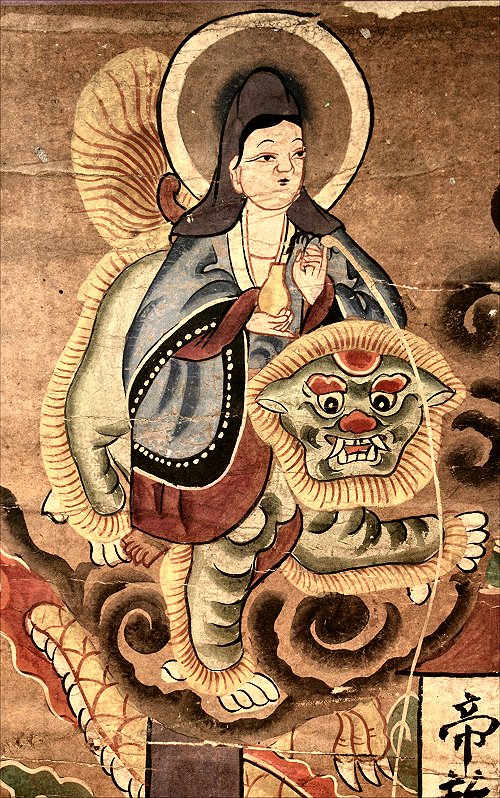
Guanyin enters in the upper left hand corner of I03 ...
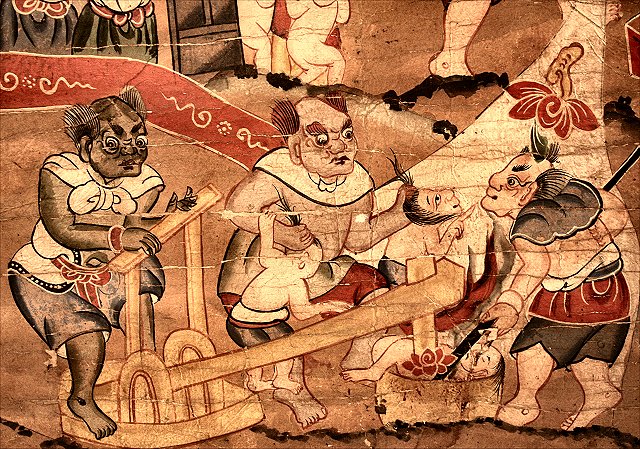
... and her elixir disperses lotus blossoms around hell, even protecting the victim under the grain pestle.
Alexander Studholme in his precis to the Karandavyuha sutra's second chapter writes: "The fires of hell are exinguished as [Avalokitesvara] approaches. The henchmen of Yama, the Lord of Death, become agitated and extremely frightened, asking who it is that has produced such inauspicious signs in Avici. When Avalokitesvara enters hell, lotuses (padmani) the size of chariot wheels appear, the infernal cooking vessel is burst open and a lotus pool (puskarini) appears in the middle of the infernal stove."
